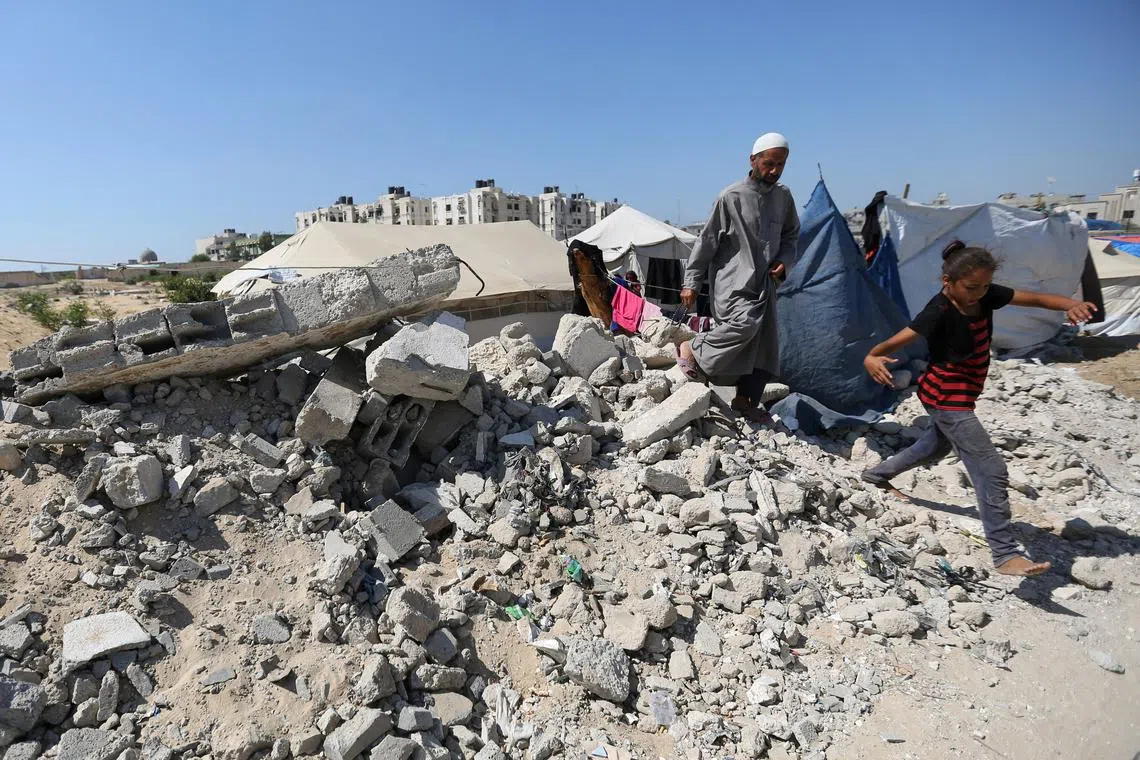Gaza truce talks to resume next week after ‘constructive’ Doha round
Sign up now: Get ST's newsletters delivered to your inbox

Gaza health officials reported on Aug 15 that the death toll there had surpassed 40,000 people.
PHOTO: REUTERS
DOHA/CAIRO - Gaza ceasefire talks will resume next week in Cairo after the United States offered a “bridging proposal” to Israel and Hamas in Doha to seal a deal, the White House said on Aug 16.
The US said the two days of talks in Doha were “serious and constructive”, and that Washington, represented by Central Intelligence Agency (CIA) Director William Burns, offered ideas to close an agreement towards ending the 10-month conflict.
“This proposal builds on areas of agreement over the past week, and bridges remaining gaps in the manner that allows for a swift implementation of the deal,” said a White House statement signed by co-mediators Qatar and Egypt.
“Senior officials from our governments will reconvene in Cairo before the end of next week with the aim to conclude the deal under the terms put forward today,” the statement said.
Until the talks reconvene in Cairo, working-level teams will work out details, including humanitarian provisions and practicalities for the release of hostages, it said.
Months of on-off talks have so far failed to overcome fundamental divisions, with Israel saying peace will be possible only if Hamas is destroyed, and Hamas saying it will accept only a permanent, rather than temporary, ceasefire.
Health officials reported separately on Aug 15 that the death toll in Gaza has surpassed 40,000 people after more than 10 months of fighting.
Overnight, Israeli forces pounded targets across Gaza and issued new orders for people to leave areas it previously designated as civilian safe zones, saying Hamas had used them to fire mortars and rockets at Israel.
In a statement issued late on Aug 15 on Telegram, Hamas politburo member Hossam Badran said Israel’s continuing operations were an obstacle to progress on a ceasefire.
He said the talks must move towards implementation of a framework agreement that was accepted previously and achieve a complete ceasefire, the withdrawal of Israeli forces, the return of displaced Palestinians and a hostage exchange deal.
“Hamas looks at the ongoing negotiations in Doha regarding a ceasefire and a hostage exchange from a strategic perspective with the goal of ending the aggression on Gaza,” Mr Badran added.
The Israeli delegation includes Mossad chief David Barnea, domestic security service head Ronen Bar and the military’s hostages chief Nitzan Alon, defence officials said.
The White House sent the CIA’s Mr Burns and US Middle East envoy Brett McGurk.
Qatari Prime Minister Sheikh Mohammed Abdulrahman Al Thani and Egypt’s intelligence chief Abbas Kamel also took part.
The negotiations, an effort to end bloodshed in Gaza and bring 115 Israeli and foreign hostages home, were put together as Iran appeared poised to retaliate against Israel after the assassination of Hamas leader Ismail Haniyeh in Tehran on July 31.
With US warships, submarines and warplanes dispatched to the region to defend Israel and deter potential attackers, Washington hopes a ceasefire agreement in Gaza can defuse the risk of a full-out wider regional war.
Israel and Hamas have each blamed the other for failure to reach a deal, yet neither side has ruled out an agreement.
Far-right members crucial to Israel’s ruling coalition oppose any truce, and Prime Minister Benjamin Netanyahu has called Hamas leader Yahya Sinwar “the only obstacle to a hostage deal”.
On Aug 14, a source in the Israeli negotiating team said Mr Netanyahu has allowed significant leeway on a few of the substantial disputes.
Gaps include the presence of Israeli troops in Gaza, the sequencing of a hostage release and restrictions on the free movement of civilians from southern to northern Gaza.
Violence has also surged in the Israeli-occupied West Bank.
The Palestinian Foreign Affairs Ministry on Aug 16 described as “organised state terrorism” a Jewish settler attack on a Palestinian West Bank village the previous day.
Israeli officials condemned the incident, the latest of its kind.
Both the White House and the European Union called it “unacceptable”.
The Palestinian Health Ministry in Ramallah said “settlers’ bullets” killed one man and critically wounded another during the attack in Jit, near Nablus.
The Israeli military said dozens of Israeli civilians, some masked, entered Jit and “set fire to vehicles and structures in the area, hurled rocks and Molotov cocktails”.
Relatives and supporters of Israeli hostages, meanwhile, again took to the streets of Tel Aviv on Aug 15. “Make deals, not war,” one of their signs said.
Meanwhile, after the discovery of poliovirus in Gaza’s wastewater, the UN on Aug 16 asked for “humanitarian pauses” to vaccinate children against polio. REUTERS, AFP


